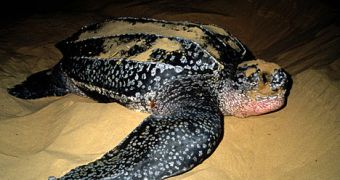It would appear that wildlife researchers are fairly nosy fellows who will stop at nothing to satisfy their curiosity.
Leatherback turtles swimming in the Atlantic and the southwest Indian Oceans learned this the hard way, when they found themselves fitted with satellite transmitters and then stalked for several years in a row.
In a press release issued just yesterday, green group the World Wildlife Fund details that, all in all, researchers led by Dr Matthew Witt of the University of Exeter and Dr Sabrina Fossette of Swansea University attached satellite transmitters to 106 leatherback turtles.
With the help of these devices, they then kept a close eye on the marine creatures' movements through the Atlantic and the southwest Indian Oceans since the year 1995 and until the year 2010.
Luckily for them, none of the turtles filed a complained with authorities or asked that a judge issue a restraining order against the researchers. Hence, the latter were able to collect information concerning their migratory routes.
It was thus discovered that, presently, leatherback turtles that use migratory routes in the Atlantic Ocean have high chances to get entangled in fishing gear and consequently die.
This is because the routes that these marine animals travel on overlap with industrial fisheries. To make matters even worse, the researchers say that, between 1995 and 2010, over 4 billion hooks were set in place in the Atlantic Ocean alone.
According to the World Wildlife Fund, specialists and conservationists now wish to use the findings of this investigation to come up with better ways to protect leatherback turtles, which are already considered a vulnerable species.
“This study demonstrates the need to take action at a regional policy level,” says Aimée Leslie with the organization. “The International Commission for the Conservation of Atlantic Tuna (ICCAT) has a unique opportunity to use this data to assess the impacts of fisheries under their watch,” the conservationist further stresses.

 14 DAY TRIAL //
14 DAY TRIAL //